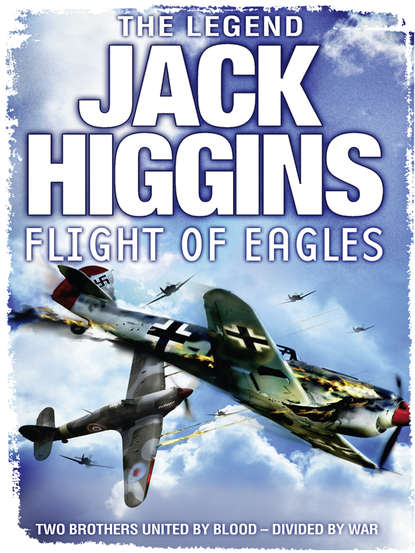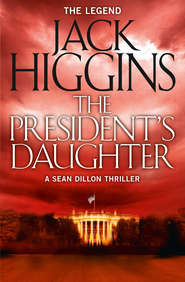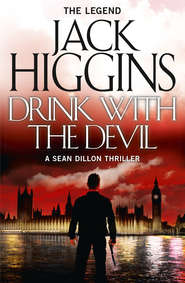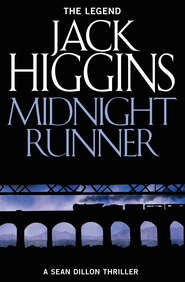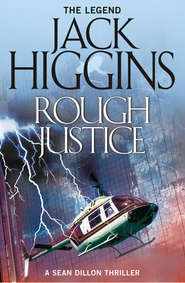По всем вопросам обращайтесь на: info@litportal.ru
(©) 2003-2024.
✖
Flight of Eagles
Автор
Год написания книги
2018
Настройки чтения
Размер шрифта
Высота строк
Поля
‘Good God. How is he?’
‘Dead. Killed in a motor accident years ago.’
‘That fits. Didn’t he use to fly with a bear?’
‘That’s right, sir. Tarquin.’ Harry picked up the bag that he’d carried out to his plane and back, took Tarquin out and sat him on the desk.
West’s face softened. ‘Well, hello, old lad. Nice to see you again.’ He raised his glass. ‘To your father and you and brave pilots everywhere.’
‘And my twin brother, sir.’
West frowned. ‘He’s a pilot?’
‘Oberleutnant in the Luftwaffe, sir.’
‘Is he now? Then all I can say is that you’re in for a very interesting war, Pilot Officer,’ and West drank his brandy.
607 Squadron was only half-way through its conversion programme when the Blitzkrieg broke on the Western Front on 10 May. In the savage and confused air war that followed, it was badly mauled and took many casualties, the old Gladiator biplanes being particularly vulnerable.
Harry, flying a Hurricane, put down two ME109s above Abbeville at 15,000 feet and although neither of them was aware of it, his brother shot down a Hurricane and a Spitfire on the same day.
The squadron was pulled back, what was left of it, to England and Dunkirk followed. Harry, awarded a DFC and promoted to Flying Officer, was posted to a special pursuit squadron code-named Hawk, near Chichester in West Sussex, only there was nothing to pursue. The sun shone, the sky was incredibly blue and everyone was bored to death.
On the other side of the English Channel, Max and his comrades sat in similar airfields on the same deck-chairs and were just as bored.
And then, starting in July, came attacks on British convoys in the Channel: dive-bombing by Stukas, heavier stuff from the Dorniers and Junkers, protected by the finest fighter planes the Luftwaffe could supply. The object of the exercise was to close down the English Channel and the RAF went up to meet it.
So Harry Kelso and his brother, the Black Baron, went to war.
The air battles over the Channel lasted through July and then came the true Battle of Britain, starting on Eagle Day, 12 August.
Hawk Squadron was based at a pre-war flying club called Farley Field in West Sussex – grass runways, Nissen huts, only four hangars – and it was hot, very hot as Harry and the other pilots lounged in deck-chairs, smoking, chatting or reading books and magazines. Two weeks of boredom, no action, had introduced a certain apathy and even the ground crews working on the dispersed Hurricanes seemed jaded.
The squadron leader, a man called Hornby, dropped down beside Harry. ‘Personally, I think the buggers aren’t coming.’
‘They’ll come,’ Harry said and offered him a cigarette.
Some of the pilots wore flying overalls, others ordinary uniform; it was too hot for anything else. On his right shoulder, Harry wore an embroidered insignia that said Finland. Beneath it was a shoulder flash of an American eagle with British and American flags clutched in its claws.
‘Very pretty,’ Hornby said.
‘Got a tailor in Savile Row to run them up for me.’
‘What it is to be rich, my Yankee friend.’ Hornby tapped the jump bag at Harry’s feet. ‘Tarquin in good fettle?’
‘Always. He’s seen it all,’ Harry told him.
‘Wish you’d lend him to me,’ Hornby said, just as they heard a loud roaring noise nearby. ‘Bloody tractor.’
‘That’s no tractor.’ Harry Kelso was on his feet, bag in hand and running for his plane as the Stukas, high in the sky above, banked and dived.
His flight sergeant tossed in his parachute. Kelso climbed into the cockpit, dropped the bag into the bottom, gunned his engine and, roaring away, lifted off as the first bombs hit the runway. A Hurricane exploded to one side, smoke billowing, and he broke through it, banking to port, carnage below, four Hurricanes on fire.
Harry banked again, found a Stuka in his sights and blew it out of the sky. There were four more, but they turned away, obviously considering their work done, and he went after them. One by one he shot them down over the sea – no anger, no rage, just using all his skill, everything calculated.
He returned to Farley Field, a scene of devastation, and managed to land on the one intact runway. He found Hornby lying on a stretcher, his left arm and his face bandaged.
‘Did you get anything?’
Harry gave him a cigarette as an ambulance drew up. ‘Five.’
‘Five?’ Hornby was astonished.
‘Stukas.’ Harry shrugged. ‘Slow and cumbersome. Like shooting fish in a barrel. They won’t last long over here. It’s ME109s we need to watch for.’
There were several bodies on stretchers, covered with blankets. Hornby said, ‘Six pilots dead. Didn’t get off the ground. You were the only one who did. Was it this bad in Finland?’
‘Just the same, only in Finland it snowed.’
The stretcher bearers picked Hornby up. ‘I’ll notify Group and suggest they promote you to flight lieutenant. They’ll get replacements down here fast. Let’s have a look at Tarquin.’
Harry opened the bag and took Tarquin out. Hornby managed to undo a small gilt badge from his bloody shirt and handed it over. ‘Nineteen Squadron. That’s where I started. Let Tarquin wear it.’
‘I sure will.’
Hornby smiled weakly. ‘Those Stukas? Were they over land or the Channel?’
‘One over land.’
‘What a pity. The bastards will never credit you.’
‘Who cares? It’s going to be a long war,’ Harry Kelso told him and closed the ambulance doors.
On the same day, Max and his squadron, flying ME109s, provided cover for Stukas attacking radar stations near Bognor Regis. Attacked by Spitfires, he found himself in an impressive dogfight, during which he downed one and damaged another, but nearly all the Stukas were shot down and three 109s. It was hurried work, with no drop tanks, so that their time over the English mainland was limited, and they had to scramble to get back across the Channel before running out of fuel. He made it in one piece, and was back over Kent again an hour and a half later, part of the sustained attacks on RAF airfields in the coastal areas.
That was the pattern, day after day, a war of attrition, the Luftwaffe strategy to destroy the RAF by making its airfields unusable. Max and his comrades flew in, providing cover to Dornier bombers and Harry and his friends rising to meet them. On both sides, young men died but there was one problem: the Luftwaffe had more pilots. As Air Chief Marshal Sir Hugh Dowding, commander-in-chief of Fighter Command once observed, it would be necessary for the RAF’s young men to shoot the Luftwaffe’s young men at the ratio of four to one to keep any kind of balance and that wasn’t likely.
So it ground on until 30 August, when Biggin Hill, the pride of Fighter Command, was attacked by a large force of Dorniers with great success and Max was one of the escorts. On the return, many Spitfires rose to intercept them and since the 109s needed to protect the bombers, too much time and too much precious fuel were used up over England. By the time Max finally turned out to the Channel, his low fuel warning light was already on.
At that same moment over the sea near Folkestone Harry Kelso shot down two Dornier bombers, but a lucky burst from one of the rear gunners hit him in the engine. He sent out a Mayday and dropped his flaps, aware of a burning smell and calmly wrestled with the canopy. He’d lost an engine over the Isle of Wight the previous week and parachuted in from 2000 feet, landing in the garden of a vicarage where he’d been regaled with tea and biscuits and dry sherry by the vicar’s two sisters.
This was different. That was the Channel down there, already the grave of hundreds of airmen, the English coast ten miles away. He reached for Tarquin in the jump bag. He’d arranged a strap with a special clip that snapped on to his belt against just such an eventuality, stood up and went out head first.
He fell to a thousand feet before opening his chute, then, the sea reasonably calm, he went under, inflated his Mae West and got rid of his parachute. Tarquin floated by him in his waterproof bag. Harry looked up into a cloudless sky. There was no dinghy to inflate – that had gone down with the Hurricane. He wasn’t even sure if his Mayday had got through.
He floated there, thinking about it, remembering comrades who’d gone missing in the past week alone. Is this it? he thought calmly and then a klaxon sounded and he turned to see an RAF crash boat coming up fast. The crew were dressed like sailors, in heavy sweaters, denims and boots. They slowed and dropped a ladder.
The warrant officer in charge looked down. ‘Flight Lieutenant Kelso, is it, sir?’





